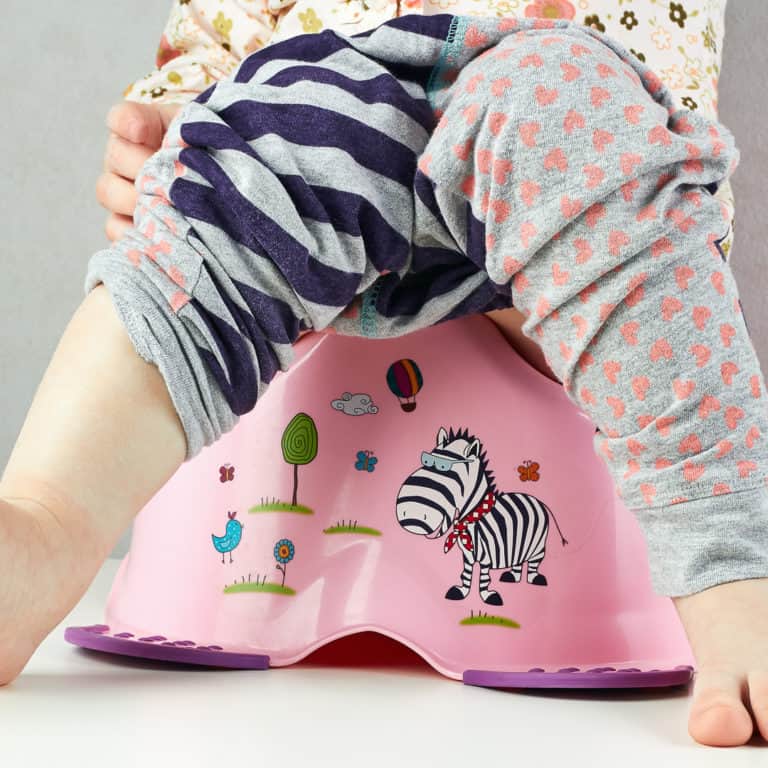Baby sleep cycles: what you need to know about sleeping through the night
Sleep is probably one of the most important topics on a new parent’s mind. I know it was something that consumed most of the first year with our daughter and is something I’m already worrying about as we’re getting closer to baby #2. Since sleep is something you’re already thinking (or dreaming) about, let’s put some facts behind when you might actually be able to get more of it. Find out the four baby sleep cycles or issues that you need to know about before sleeping through the night.
Note that all babies are different, and the guidelines below are simply that – guidelines. Some babies may sleep through the night at two months, and others might take nine months. They’re all on their own schedule, but in this phase, it’s helpful to new parents to know what to look for.
This post probably contains affiliate links. That means if you buy something using one of my links I may receive a small commission – at no additional cost to you! How cool is that? It’s kind of boring, but feel free to read my full disclosure if you want more info
Baby Sleep Cycles Phase 1: Newborn Sleep
(Or lack thereof). I hate to be the bearer of bad news, but if you’re here you probably already know this. Newborns don’t sleep for long stretches at a time. You might look at your baby and wonder how she’s always sleeping and yet you’re always exhausted. This is most likely due to the fact that she’s waking every couple of hours to eat around the clock.
Most newborns have their days and nights mixed up, and this can take a few weeks to fix.
Although newborns can sleep up to 18 hours a day, they also need to eat every 2-3 hours. By the time you’re finished feeding, this can feel almost constant in the early weeks. Feeding on demand is key, especially if you’re breastfeeding.
In this phase, it’s best to just sleep when you can, drink coffee, and hang on tight. Although the days are long and the nights are longer, you really will get through this.
Related: Will I ever sleep again?
Infant Sleep Phase 2: The Transition to REM Sleep
(a.k.a. The four month sleep regression).
Around three to four months your baby will start to sleep longer stretches at night and will move into sleep cycles that more closely mirror an adult.
Since this is a big sleep milestone and transition, many babies go through a sleep regression during this phase, commonly known as the four-month sleep regression. If this is something you’re dealing with know that you have my deepest sympathies. This was the worst part of our daughter’s sleep the first year and was something that was scarring to my husband and I. We did everything we could to not go back to that time.
It’s important to be aware of this phase because it’s when a lot of parents introduce sleep crutches that become detrimental to good sleep later on. While my biggest motto of the four-month sleep regression is to do what you have to in order to survive, you really don’t want to create any lasting bad sleep habits.
For more information on the four-month sleep regression and how to deal check out this article.
Once your baby makes this transition her sleep is now permanently changed. If her sleep/wake cycles have adjusted they’re likely now your new normal. Our two month old was sleeping 8-9 hours at night and after this regression, she cut down to 4-5.
When will baby sleep through the night?
It’s important to note that “sleeping through the night” means about six hours of sleep in a row. Babies typically need lots of night rest. Your baby can be “sleeping through the night” going to bed at 7 p.m. and be up at 1-2 a.m. This still wreaks havoc on your ability to get long stretches of sleep.
This typically happens somewhere between 3-6 months but could be as late as nine months or longer. Your baby may be sleeping through the night long before you actually get an uninterrupted eight hours of rest.
One of the best things we did to get longer stretches of sleep was to use a SNOO Smart Sleeper Bassinet. It’s a high tech bassinet that uses continuous motion and white noise to help soothe baby to sleep and keep her asleep longer. It was a game-changer for our second daughter, and she was sleeping 6-7 hours in a row by two months. Read more about our experience in the review below!
Related: Why we loved our SNOO Smart Sleeper Bassinet

Baby Sleep Phase 3: Separation Anxiety & Skill Development
Another possible hiccup in your baby’s sleep happens between 8-10 months when she’s learning new skills and starts to have real separation anxiety. This one of the most unfortunate baby sleep cycles, because she may have already been sleeping through the night.
Learning things like pulling up in the crib and cruising can become fun to practice at night. This will disrupt both your child’s and your sleep cycles.
Additionally, babies around this age also begin to understand object permanence, which means they know you’re around even when you’re not there. This results in lots of “requesting” for mom or dad to come back in the room to help them sleep.
Your baby might have been sleeping fine, and then bam, separation anxiety or new skills happen – pushing you back into the land of night wakings.
Grab your FREE printable download, the four key phases of infant sleep so you can keep it handy and know what to expect the first year.
Infant Sleep Phase 4: Self-Soothing and Sleeping Through the Night
This is what most parents think of when they envision “sleeping through the night.” They’re upset to learn that this isn’t what many experts consider sleeping through the night for a baby. In this phase, your baby will wake up and self-soothe. WITHOUT needing you to come back in and put her back to sleep. (Ah-mazing).
Related: 9 tips to get baby to fall asleep alone
Most infants will sleep 11+ hours at night from about six months onward. In this phase, they may still be calling out for help going back down. Once your baby no longer needs you to go back to sleep, you’ll have much more flexibility in your own sleep routines.
For us, this didn’t happen until around 11 months, when our daughter finally started sleeping until 5 a.m. At a year, she stretched to 6 a.m. We were up at 6 a.m. for about a year. By the time she was two we were able to get to around 6:45 a.m. She’s three and a half now and we’ve been living in the land of good sleep for a while.
The arrival of her sister will definitely disrupt things – so we’re preparing now. I’m going to hold tight to the fact that none of these sleep phases lasts forever.
If you found this article helpful, please pin it for later. Sharing is caring!


Reference Information:








